But the Natives were wasted, poor heroic wild creatures. They were gathered together in little settlements on the neighboring islands, and paternally cared for by the Government, and instructed in religion, and deprived of tobacco, because the superintendent of the Sunday-school was not a smoker, and so considered smoking immoral.
The Natives were not used to clothes, and houses, and regular hours, and church, and school, and Sunday-school, and work, and the other misplaced persecutions of civilization, and they pined for their lost home and their wild free life. Too late they repented that they had traded that heaven for this hell. They sat homesick on their alien crags, and day by day gazed out through their tears over the sea with unappeasable longing toward the hazy bulk which was the specter of what had been their paradise; one by one their hearts broke and they died.
In a very few years nothing but a scant remnant remained alive. A handful lingered along into age. In 1864 the last man died, in 1876 the last woman died, and the Spartans of Australasia were extinct.
 |
The Whites always mean well when they take human fish out of the ocean and try to make them dry and warm and happy and comfortable in a chicken coop; but the kindest hearted white man can always be depended on to prove himself inadequate when he deals with savages. He cannot turn the situation around and imagine how he would like it to have a well-meaning savage transfer him from his house and his church and his clothes and his books and his choice food to a hideous wilderness of sand and rocks and snow, and ice and sleet and storm and blistering sun, with no shelter, no bed, no covering for his and his family's naked bodies, and nothing to eat but snakes and grubs and offal. This would be a hell to him; and if he had any wisdom he would know that his own civilization is a hell to the savage -- but he hasn't any, and has never had any; and for lack of it he shut up those poor natives in the unimaginable perdition of his civilization, committing his crime with the very best intentions, and saw those poor creatures waste away under his tortures; and gazed at it, vaguely troubled and sorrowful, and wondered what could be the matter with them. One is almost betrayed into respecting those criminals, they were so sincerely kind, and tender, and humane, and well-meaning.
They didn't know why those exiled savages faded away, and they did their honest best to reason it out. And one man, in a like case in New South Wales, did reason it out and arrive at a solution:
"It is from the wrath of God, which is revealed from heaven against all ungodliness and unrighteousness of men."
That settles it.
 [In 1897 Mark Twain published a book
Following the Equator, an account of a round-the-world
lecture tour. He visited Tasmania, and recounts the history of the
by-then extinct native population. Some excerpts:]
[In 1897 Mark Twain published a book
Following the Equator, an account of a round-the-world
lecture tour. He visited Tasmania, and recounts the history of the
by-then extinct native population. Some excerpts:]